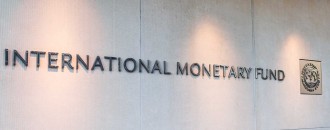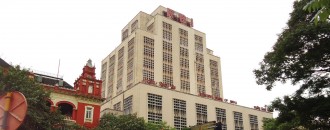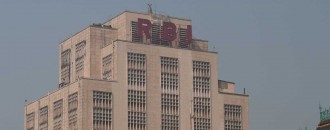
Indias economy is recovering; to grow at 7.3% in 2018-19: Fitch
The Dollar Business Bureau International credit rating agency Fitch on Thursday projected India’s economic growth rate at 7.3% in the next financial year of 2018-19 and at 7.5% in the 2019-20 fiscal, as the Indian economy is showing signs of recovery because the disruptions caused due to demonetisation and goods and services tax (GST) have gradually diminished. However, India’s economic growth rate is estimated at 6.5% in the current fiscal, a little lower than the official estimates of 6.6% by the Central Statistics Office (CSO),” according the Fitch’s Global Economic Outlook report. Indian economy grew at the rate of 7.1% in 2016-17. “The pick-up in growth is likely as the influence of one-off policy-related factor which was dragging growth has now waned,” the US-based ...

India to grow at 7.4% in FY19: IMF
The Dollar Business Bureau International organisation International Monetary Fund (IMF) on Monday projected India’s gross domestic product (GDP) growth at 7.4% in the financial year 2018-19, making India being the ‘fastest-growing’ economy among the emerging economies. “India is forecast to grow at 7.4% in 2018-19 against 6.7% this year, gaining pace to 7.8% in 2019-20,” the IMF said in its report World Economic Outlook: Brighter Prospects, Optimistic Markets, Challenges Ahead. China’s economy growth rate at 6.8% in 2017 was higher than India’s 6.7% but the former’s growth will slip to 6.6% next year. In 2016, India’s economy grew at 7.1% but slowed in 2017 due to demonetisation and rollout of GST. The IMF kept the aggregate growth projections unchanged for emerging markets and developing ...

Indias textile market to reach $250 bn in 2 years: ASSOCHAM study
The Dollar Business Bureau India’s textiles market is likely to reach $250 billion in the coming two years from the present level of $150 billion, according to a study. “The market size of India’s textile market is expected to touch $250 billion in the next two years from the current level of $150 billion,” said a joint study conducted by ASSOCHAM-Resurgent on ‘Women in Textiles & Handicrafts Industry'. “The textile sector in India makes up for about 10% of the manufacturing production, 5% of the country’s GDP and 13% of its exports earnings,” the study said. The study observed that the textiles and apparel sector is the 2nd biggest employment provider with around 51 million people directly and more than 68 million people indirectly ...

Raghuram Rajan clears the air about his role in demonetisation through his book
The Dollar Business Bureau At an event in Chennai for launching his book, ‘I Do What I Do: On Reforms Rhetoric and Resolve’, an edited version of his speeches and articles, former RBI governor Raghuram Rajan, spoke candidly to the media and voiced his opinions on demonetisation and its impact. On demonetisation It is almost 9 months post-demonetisation and with the Reserve Bank of India releasing a press statement last week that almost 99% of the Rs 15.44 lakh crore worth of banned notes are back into the system, ground results show that there has been a slowdown in the economy. The recall of the Rs 500 and Rs 1000 notes decision taken by the Modi-government hasn’t fetched the expected results. And the ...

RBI gets nod from Finance Ministry to print new Rs 200 notes
The Dollar Business Bureau The Government on Wednesday gave its approval to the Reserve Bank of India (RBI) for issuing Rs.200 banknotes that will improve the currency situation and ease the pressure on lower value notes. “On the recommendations of the Central Board of Directors of the RBI, the Central Government hereby specifies the denomination of banknotes of the value of Rs.200,” the Ministry of Finance said in a notification. The new notes of Rs.200 denomination are expected to be in circulation soon. However, it had been reported that the RBI would bring in these new notes in the month of March, after having consultation with the Ministry of Finance. The step for printing Rs.200 notes is being taken in order to further improve ...

Govt has not attracted much FDI in manufacturing, Prakash Karat
By Manishika Miglani The ruling party BJP had made a host of promises during its election campaign such as creating enough jobs and consolidating the business sentiments in the country. Prakash Karat, former General Secretary, Communist Party of India (Marxist), in an interview with The Dollar Business, talks about the current government’s performance on these fronts and also shared his views on the impact and scenario post-demonetisation. TDB: Has the demonetisation move by the Government served its purpose of eradicating black money, stopping terrorism funding and driving India towards a cashless economy? Prakash Karat (PK): The stated intention of the Government for withdrawing Rs.500 and Rs.1000 notes from circulation was to help curb black money, corruption and to stop terrorist funding. But this exercise has ...

Marginal growth in core sector industries; Cotton sowing pushes up Kharif sowing acreage; Forex reserves hit life-time highs
By Abin Daya Change is an unavoidable part of life - and of doing business. One of the biggest changes to the way we do business happened last Friday, with the rolling out of the GST. Yes, there will be disruptions in the short term and the cost of compliance will go up. Also, many small businesses will lose the tax arbitrage that enabled them to price below that of the larger companies. It will also increase the financing cost of business, particularly for those engaged in foreign trade. Speaking of financing, even that is not going to be easy. While credit growth is down because of low credit demand driven by the leveraged position of corporates combined with muted demand, even where businesses ...

Overall healthcare cost could increase post GST, Chairman Reddy
The Dollar Business Bureau The cost of overall healthcare could rise after the implementation of Goods and Services Tax (GST) as some of the products and services will be levied with 15-18% tax, while healthcare has been exempted, said Apollo Hospitals Chairman Prathap C Reddy on Tuesday. Reddy said that if there is a surge in the cost of healthcare by up to 2%, hospitals would be able to absorb the increase but any hike beyond that would have to be borne by the patients. “There is no GST for us but there are services and some products with GST rate ranging from 15 to 18% that have fallen on us. So, after GST the cost increase for hospitals will be around 2% ...

